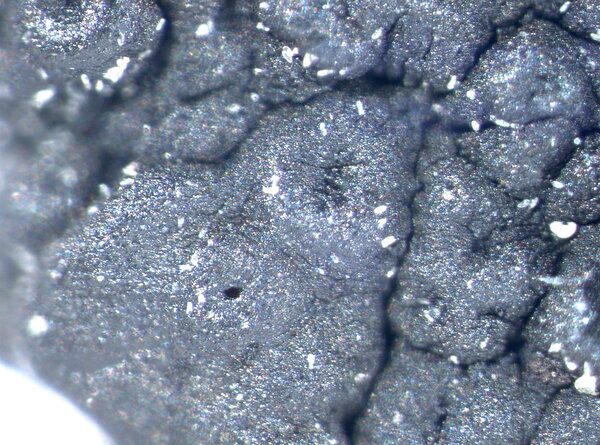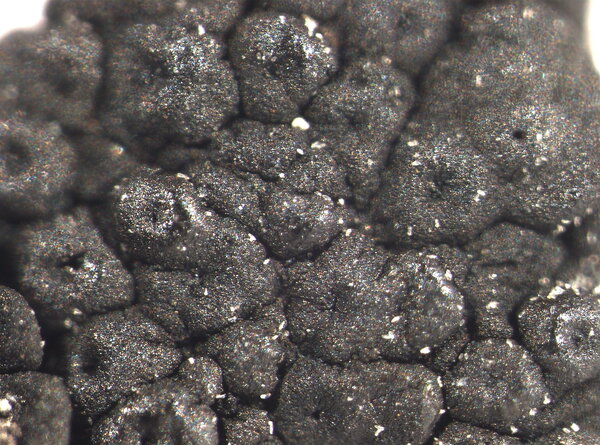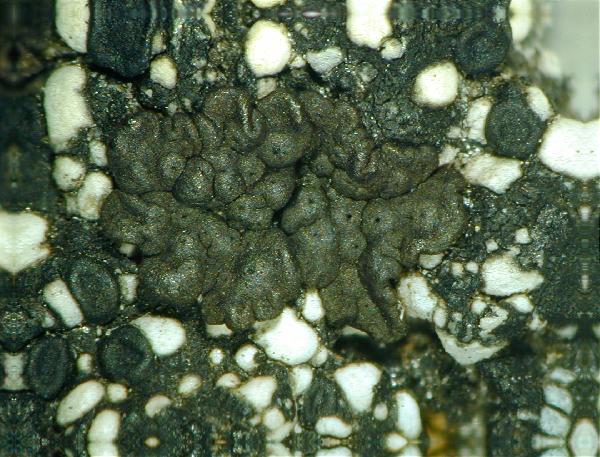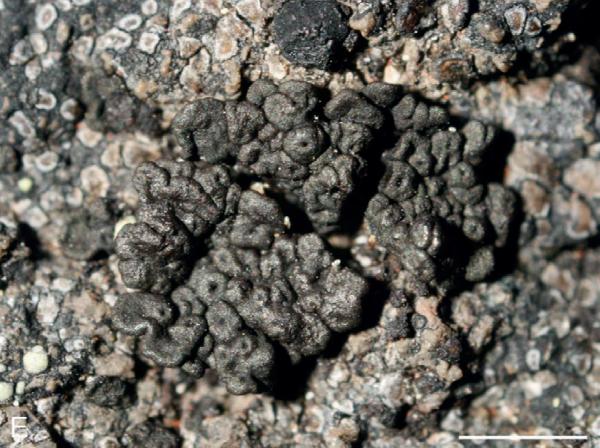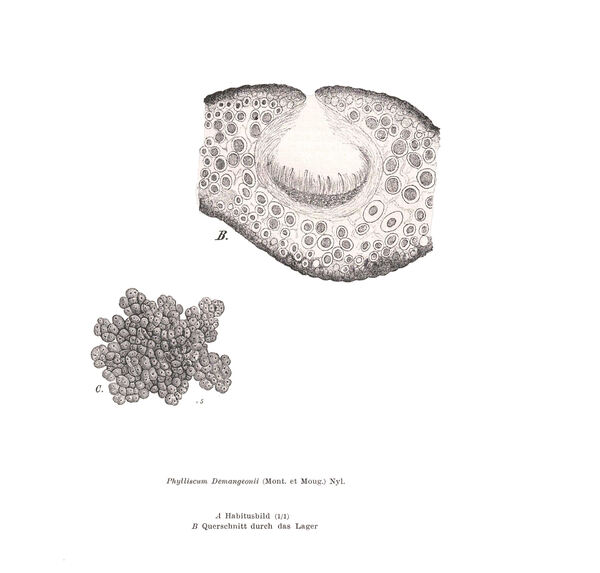Phylliscum demangeonii (Moug. & Mont.) Nyl.
Mém. Soc. Imp. Sc. Nat. Cherbourg, 3: 166, 1855. Basionym: Collema demangeonii Moug. & Montagne in Montagne - Ann. Sc. Bot., 3 sér., 12: 291, 1849.
Synonyms: Endocarpon phylliscum Wahlenb.; Phylliscum endocarpoides Nyl.
Distribution: N - TAA (Nascimbene & al. 2022), Piem (Isocrono & al. 2004, Watson 2014). S - Cal (Puntillo 2011).
Description: Thallus squamulose-umbilicate, homoiomerous, gelatinous when wet, greyish black, forming more or less continuous dark patches. Squamules overlapping, somewhat inflated, hollow in central parts, attached by a broad central holdfast, up to 5(-8) mm wide, with incised, often slightly upturned margins and a more or less areolate upper surface. Ascomata punctiform and perithecioid, 5-15 per squamule, laminal, immersed in up to 0.4 mm wide thalline swellings, the ostiolar region visible as a small depression. Proper exciple distinct, surrounding the hymenium; hymenium colourless, I+ blue, without true paraphyses, but filled with anastomosing hyphae. Asci (8-)16(-24)-spored, inversely clavate, acuminate, thin-walled. Ascospores 1-celled, but often appearing 1-septate by plasma-bridges dissolving in K, hyaline, ellipsoid, 7-10 x 4-5 μm. Pycnidia immersed. Conidia needle-like, curved, 4-7 x 1-2 µm. Photobiont cyanobacterial, chroococcoid, with 15-35(-40) μm wide cells enclosed into 1-2, reddish-violet gelatinous sheaths. Spot tests: all negative. Chemistry: without lichen substances. Note: a cool-temperate to boreal-montane, probably circumpolar lichen found on steeply inclined seepage tracks of siliceous rocks, mostly in upland areas; probably more widespread in the Alps.
Growth form: Foliose, umbilicate
Substrata: rocks
Photobiont: cyanobacteria, coccaceous (e.g. Gloeocapsa)
Reproductive strategy: mainly sexual
On otherwise dry surfaces with short periods of water seepage after rain
Commonnes-rarity: (info)
Alpine belt: absent
Subalpine belt: extremely rare
Oromediterranean belt: absent
Montane belt: very rare
Submediterranean belt: absent
Padanian area: absent
Humid submediterranean belt: absent
Humid mediterranean belt: absent
Dry mediterranean belt: absent

Predictive model
Herbarium samples
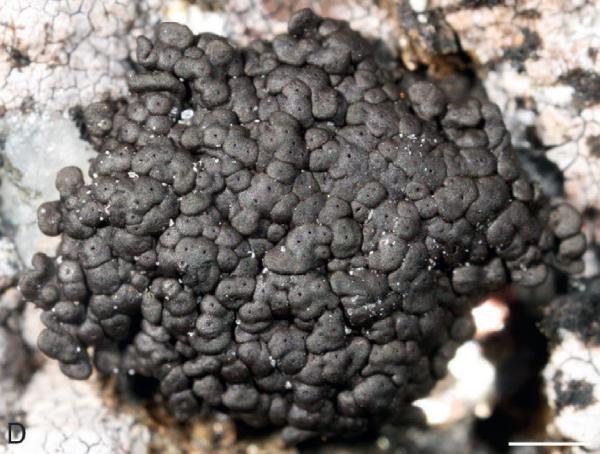
Source: Prieto M., Wedin M., Schultz M. 2024. Phylogeny, evolution and a re-classification of the Lichinomycetes. Studies in Mycology, 109: 595-655. - CC BY-NC-ND
Phylliscum demangeonii, squamulose, umbilicate-rosette shaped, pycnoascocarps remaining immersed and with pin hole discs (Schultz
16868). Scale bar: 1 mm
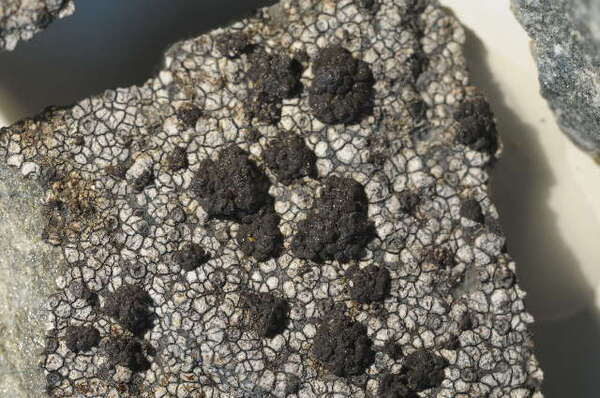
Einar Timdal, Natural History Museum, University of Oslo, Norway CC BY-SA-NC – Source: http://www.boldsystems.org/index.php/Taxbrowser_Taxonpage?taxid=481914
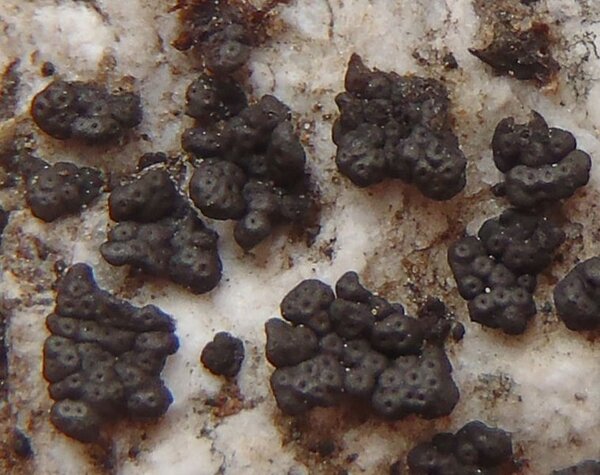

Curtis Randall Björk – CC BY-SA 4.0
Idaho, Idaho County, Selway River Date: 2005-06-05 On granite on shore of pristine river
Growth form: Foliose, umbilicate
Substrata: rocks
Photobiont: cyanobacteria, coccaceous (e.g. Gloeocapsa)
Reproductive strategy: mainly sexual
On otherwise dry surfaces with short periods of water seepage after rain
Commonnes-rarity: (info)
Alpine belt: absent
Subalpine belt: extremely rare
Oromediterranean belt: absent
Montane belt: very rare
Submediterranean belt: absent
Padanian area: absent
Humid submediterranean belt: absent
Humid mediterranean belt: absent
Dry mediterranean belt: absent

Predictive model
| Herbarium samples |

Source: Prieto M., Wedin M., Schultz M. 2024. Phylogeny, evolution and a re-classification of the Lichinomycetes. Studies in Mycology, 109: 595-655. - CC BY-NC-ND
Phylliscum demangeonii, squamulose, umbilicate-rosette shaped, pycnoascocarps remaining immersed and with pin hole discs (Schultz 16868). Scale bar: 1 mm

Einar Timdal, Natural History Museum, University of Oslo, Norway CC BY-SA-NC – Source: http://www.boldsystems.org/index.php/Taxbrowser_Taxonpage?taxid=481914


 INDEX FUNGORUM
INDEX FUNGORUM
 GBIF
GBIF
 DOLICHENS
DOLICHENS
